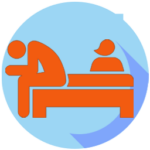Sleep is a fundamental aspect of human life, contributing to our physical health, mental well-being, and overall quality of life. However, for many individuals around the world, the act of falling asleep and maintaining restful slumber remains elusive. Sleep disorders are a common but often misunderstood health concern that can significantly impact daily life. In this blog, we will explore the world of sleep disorders, shedding light on their causes, types, and potential solutions.
Understanding Sleep Disorders
Sleep disorders encompass a wide range of conditions that affect a person’s ability to fall asleep, stay asleep, or experience restorative sleep. These conditions can result in daytime fatigue, mood disturbances, and even chronic health problems. Let’s delve into the causes and common types of sleep disorders:
Causes of Sleep Disorders:
- Medical Conditions: Some medical conditions, such as sleep apnea, restless legs syndrome, and chronic pain, can disrupt sleep patterns.
- Mental Health Disorders: Conditions like anxiety, depression, and post-traumatic stress disorder (PTSD) can lead to insomnia and other sleep disturbances.
- Lifestyle Factors: Irregular sleep schedules, excessive caffeine or alcohol consumption, and poor sleep hygiene can contribute to sleep disorders.
- Medications: Certain medications can interfere with sleep patterns as a side effect.
Common Types of Sleep Disorders:
- Insomnia: Characterized by difficulty falling asleep or staying asleep, insomnia is one of the most prevalent sleep disorders. It can be acute (short-term) or chronic (long-term).
- Sleep Apnea: Sleep apnea involves interrupted breathing during sleep due to the relaxation of throat muscles. It can lead to loud snoring and daytime sleepiness.
- Restless Legs Syndrome (RLS): RLS causes an irresistible urge to move the legs, often accompanied by uncomfortable sensations. It typically worsens at night.
- Narcolepsy: Narcolepsy is a neurological disorder characterized by excessive daytime sleepiness and sudden, uncontrollable episodes of falling asleep.
- Parasomnias: Parasomnias are abnormal behaviors or movements during sleep, such as sleepwalking, night terrors, or talking in one’s sleep.
- Circadian Rhythm Disorders: These disorders disrupt the body’s internal clock, leading to sleep-wake cycle disturbances. Examples include shift work sleep disorder and jet lag.
Solutions and Management
The good news is that many sleep disorders are treatable, and strategies exist to improve sleep quality and duration. Here are some approaches to managing sleep disorders:
- Lifestyle Modifications: Establish a regular sleep schedule, create a comfortable sleep environment, and practice good sleep hygiene (e.g., limiting screen time before bed).
- Cognitive Behavioral Therapy (CBT): CBT for insomnia is a highly effective therapy that helps individuals change negative thought patterns and behaviors related to sleep.
- Medications: In some cases, medications may be prescribed to manage sleep disorders. These should be used under the guidance of a healthcare professional.
- Continuous Positive Airway Pressure (CPAP): CPAP therapy is a common treatment for sleep apnea, involving the use of a machine that delivers a steady stream of air to keep airways open during sleep.
- Behavioral Therapy: Behavioral therapies can be effective for conditions like restless legs syndrome and certain parasomnias.
- Medication Review: If medication side effects are contributing to a sleep disorder, consult with a healthcare provider about alternative treatments.
Conclusion
Sleep disorders can have a profound impact on an individual’s physical and mental health. Recognizing the signs and seeking professional help is the first step towards a better night’s sleep and improved well-being. Whether through lifestyle changes, therapy, or medical interventions, there are solutions available to help individuals overcome the challenges of sleep disorders and enjoy the restorative benefits of a good night’s sleep. Prioritizing sleep health is an investment in one’s overall quality of life and long-term health.
If you suffer from Narcolepsy, we advise taking Generic Modvigil












